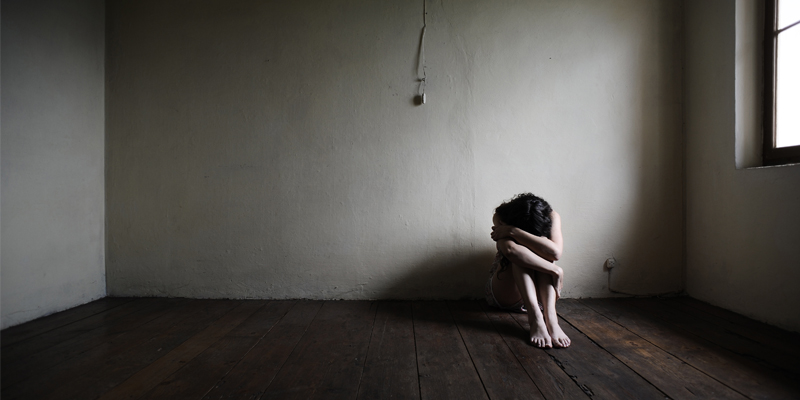Helping Our Children: The Lies Anxiety Tells Us
I’ve written quite a bit about anxiety, and to be honest, I don’t plan on stopping anytime soon. It’s a topic that’s very close to my (rapidly beating) heart and very present in my home.

I am an anxious parent of an anxious child. I face anxiety every single day of my life in one form or another, be it my own or my kiddo’s. While my knowledge and familiarity can’t make it just go away, my experience has given me plenty of insight into how anxiety works – how it creeps, how it sneaks, how it attacks, how it talks, how it convinces, how it distracts, and how it lies.
Anxiety Comes In Many Forms (for children and adults)
Anxiety comes in many forms: anger, irritability, OCD, hoarding, social anxiety, agoraphobia, PTSD, panic disorder, and more. It can be found in all ages of people, across racial barriers, socioeconomic status, and level of education.
There are genetic links that suggest anxiety can be familial, but it can also sprout up in a perfectly unassuming gene pool. It can be the result of a chemical imbalance, a misfiring brain, a traumatic experience, an overwhelming situation, or just plain chance.
Anxiety does not care who you are, what you know, where you’re from, or what you had planned for that day. Anxiety does not care that you have a counseling degree and should be able to control your reactions better, or even recognize anxiety in your own child. Nope, it sinks it’s teeth into you and starts whispering away, stealing your breath and feeding you lies, convincing you that you’re in danger or that a counseling degree means you shouldn’t suffer from anxiety… or that you should have been able to identify your child’s struggles sooner.
Anxiety Is Individualized
Because anxiety is not one-size-fits-all, your struggle may very well look different from those of others with anxiety. Anxiety will take this opportunity to convince you that you’re all alone, that no one understands you or what you’re going through, that there’s something wrong with you.
Anxiety will isolate you, either physically while you catch your breath and calm your heart, or emotionally, by convincing you that you’re not like everyone else, that you’re not going to fit in. Insecurity to anxiety is like a bucket of chum to a shark. Worry worms it’s way into the cracks of your self esteem and your self-image is no longer accurate. Looking in the mirror, part you and part fear, you start to believe that no one wants you there, that everyone is focused on the blemish, that everyone is disgusted by the weight, that you’re irritating, obnoxious, not as smart as you think and not as funny as you’d hoped.
Anxiety lies to you and tells you that you’re someone you’re not. Anxiety lies to our children too.
Related: When Anxiety Looks Like Anger
The Fight Or Flight Response
Anxiety will tell you you’re in danger. The bridge you’re driving on – did it just sway? Has anyone else noticed that crack? How high is it and just what is beneath it? The window you’re not sure is latched, the car you’re concerned doesn’t have enough air in the tires, the pilot light in your house – they’re always there, always waiting to fail you, to hurt you, if you aren’t ever-vigilant, ever-aware. The person coughing next to you, the handle of that door at the grocery store, the sore throat you feel coming on, and what is that pain in your leg, a blood clot? The pain and tightness you feel in your chest as you begin to worry, anxiety will convince you that you’re dying. If insecurity attracts anxiety then the internet feeds it. Various and sundry medical sites have just enough information to sort of line up the symptoms of both benign and deadly conditions, leaving you fretting in the dark, eyes wide in the glow of your screen, totally alone in your attempt to discern whether or not your headache is dehydration or a brain tumor.
Anxiety will trigger your fight-or-flight response and have you walking through life with your body tensed, always looking for disaster and never seeing the perfectly pleasant. Anxiety has you convinced that accidents await, catastrophe is imminent, the worst is coming and there’s nothing you can do about it. Anxiety lies.
Anxiety doesn’t just lie, either – it steals. It steals your peace, your comfort, steals moments and taints memories. Anxiety tells you that you’re smart to spend so much time worrying, convinces you that it’s better to be prepared, that you’ll surely save yourself from danger/diagnosis/death/destruction by thinking about every possible outcome. Anxiety will tag along on a trip and steal the rest from you as you worry about your house back home. It will accompany you to the zoo and steal the memory of your child’s smile as you make note of how you can safely jump into the cheetah enclosure should your little one fall in. A summer afternoon can be stolen as quickly as you notice a storm cloud, a field trip loses the excitement when you agonize over the safety of the bus, or the road, and there’s that bridge again…
Anxiety steals. It steals and convinces you that what you’ve given up is worth the it in the name of preparedness, observation, and common sense. Anxiety tells you that you’re brilliant for brooding and smart for stewing. Anxiety steals. Anxiety lies.
Related: Helping Your Child Cope With Anxiety
The Lies Anxiety Tells Us
One of the worst aspects of the lies anxiety tells you is that they almost always contain a shred of truth. It’s been said that the best lies are rooted in truth, and anxiety has mastered this. Yes, technically, the bridge could be structurally unsound, and yes, you could contract a rare and deadly disease. Whatever may be statistically unlikely, anxiety will focus your attention on that small number of probability and convince you that you’re the one, you’re the victim, you’re the exception. Yes, people are looking at you, just as you glance at strangers or make eye contact during conversation with a friend. But anxiety will take that shred of truth and convince you that they’re staring, they’re noticing, they’re judging. Yes, break-ins and accidents and humiliation all happen. Yes, death and sickness and severe weather are all inevitable. Yes, things break and stuff gets lost and sometimes, sometimes bad things happen. These are inescapable truths to life that anxiety will dress as approaching monsters, not inevitable hurdles. Anxiety will acknowledge their existence by convincing you that they are out to get you, and worse, that if you just think and worry and obsess hard enough, you’ll find a way around them. Even when dealing with the truth, anxiety lies.
Anxiety tells you that you can’t beat it. Worry is a natural part of life, after all, and self-preservation is an innate reaction all humans experience. Anxiety wraps itself around you so tightly that instead of feeling confined, you begin to feel protected, safe in your considerations of all things awful. Better to be prepared and anxious than caught off guard and failing miserably, right?
That’s the worse lie of all – that you need anxiety to be successful. That without the worry, the obsessing, the hypervigilance and the torment, you’d fail. Anxiety convinces you that worry is preparedness. Why, then, would you want to stop thinking? Why would you want to turn off these receptors in your brain that can run a hundred different scenarios at once? What might become of you if you didn’t put so much thought into everything and just… took a step? Anxiety will give you some possible outcomes, all leading to your certain demise, because anxiety has convinced you that you’re protecting yourself by handing your thoughts over. Anxiety insists there is no freedom, only ignorance.
Anxiety has tortured and comforted you with the promise of ruin if you don’t think enough. Anxiety has lied.



